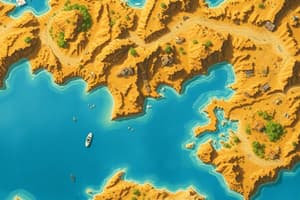Podcast
Questions and Answers
What is a physical map?
What is a physical map?
Reference map that shows identifiable natural landmarks such as mountains, rivers, oceans, and elevation.
What does a political map display?
What does a political map display?
Political boundaries, e.g., countries, cities, capitals.
What is a thematic map?
What is a thematic map?
A map used to display specific types of information pertaining to an area.
Define a cartogram.
Define a cartogram.
What does a choropleth map use to show statistical data?
What does a choropleth map use to show statistical data?
What is meant by absolute distance?
What is meant by absolute distance?
What is the difference between absolute direction and relative direction?
What is the difference between absolute direction and relative direction?
What does spatial scale refer to?
What does spatial scale refer to?
What is GIS?
What is GIS?
What is satellite navigation system?
What is satellite navigation system?
Define sustainability in the context of resources.
Define sustainability in the context of resources.
Which of the following is a definition of globalization?
Which of the following is a definition of globalization?
Flashcards are hidden until you start studying
Study Notes
Types of Maps
- Physical Map: Highlights natural features like mountains, rivers, and elevation levels.
- Political Map: Displays political boundaries, including countries, cities, and capitals.
- Thematic Map: Focuses on specific themes or types of information relevant to a geographic area.
Thematic Map Variations
- Cartogram: Transforms space to represent statistical data, illustrating concepts like population.
- Choropleth Map: Utilizes shading or colors to represent statistical data (e.g., population density).
- Dot Density Map: Uses dots to represent occurrences of a feature (e.g., population distribution).
- Graduated Symbols Map: Variations in symbol size represent relative value magnitude (e.g., varying population sizes).
- Isoline Map: Connects locations of equal value with lines, useful for showing gradual changes in data.
Measurements in Geography
- Absolute Distance: Uses standard units (e.g., miles, kilometers) for measurement.
- Relative Distance: Reflects social, cultural, and economic connections between locations (e.g., different relations between the USA and Iran vs. China).
- Absolute Direction: Identifies location using compass directions (e.g., north, south).
- Relative Direction: Identifies position without compass terms (e.g., left, right).
Key Geographic Concepts
- Spatial Patterns: Refers to the organization of objects and features on Earth’s surface.
- Clustering: Groups of objects, commonly seen in coastal populations.
- Dispersal: Scattered arrangements of objects, typical in rural areas.
- Elevation: Measures height above sea level.
- Spatial Scale: Hierarchical organization of geographic areas (e.g., global, regional, national, local).
- Scale of Analysis: Examines data across varying geographic scales.
Mapping Techniques
- Map Distortion: All maps are subject to distortion due to the projection of a 3D surface onto a 2D plane.
- Map Projection: Method of transferring 3D Earth surfaces onto 2D maps, minimizing distortions in area, distance, and shape.
Geographic Information Systems (GIS)
- Combines multiple layers of spatial data for analysis and insight into geographic patterns (e.g., crime rates, school boundaries).
- Supports visualization and analysis of geographic data.
Data Collection and Tools
- Census Data: Systematic recording of information about populations.
- Satellite Imagery: Captures images of Earth from various satellites.
- Remote Sensing: Data collection through distant instruments.
- Online Mapping: Web platforms that provide graphical and textual geographic information.
Location Concepts
- Absolute Location: Defines precise coordinates using latitude and longitude.
- Relative Location: Describes a position in relation to other features.
Spatial Relationships
- Space: Gains meaning through its relations with other concepts and phenomena.
- Place: Area defined by unique social and physical characteristics.
- Pattern: Arrangement of objects and spaces between them on Earth.
Interaction and Connectivity
- Distance Decay: Interaction likelihood decreases with increased distance.
- Time-Space Compression: Describes the enhanced connectivity facilitating closer interactions despite physical distance.
- Movement: Encompasses the transportation of people, goods, and ideas between locations.
- Flows: Describes a continuous movement, often observable in migration patterns.
Global Trends
- Globalization: Increases interconnectedness across countries in economic, political, and cultural dimensions.
- Networks: Comprises systems of interconnected entities (e.g., transportation, communication).
- Sustainability: Balancing resource demand with future needs by protecting environmental capacity.
Studying That Suits You
Use AI to generate personalized quizzes and flashcards to suit your learning preferences.




